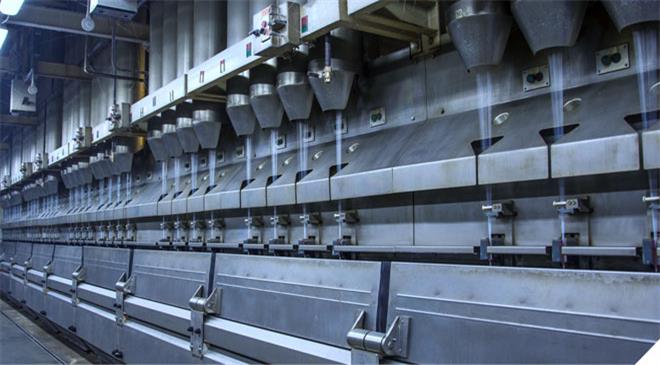Developing new antiviral fibre to fight against COVID-19
Domo Group's heritage traces back to 1991 when it began manufacturing carpets and yarn in Ghent, Belgium. Today the group is an integrated nylon solutions provider. Fibre2Fashion spoke to Florent Cottin, Sales Development Manager, Domo Chemicals, about the factors which are contributing to the growth of the company, new product launches and new markets that Domo would like to explore.
What are the factors contributing to the growth of the polyamide materials business?
Next to the significant historical polyamide demand for textiles in Asia, there is also an increas-ing demand for engineering plastics. This increasing demand for engineered materials is mainly driven by the automotive sector (metal replacement and electrification) and several industrial and consumer goods applications (appliances and power tools markets). With the pandemic we have also seen a real surge in the office furniture sector and in the construction industry.
Global automotive demand remains significant, especially out of Europe with a supply demand challenge mainly identified on raw material availability for polyamide 6 and polyamide 66 value chains. Production has been hit by several factors including lockdowns, plant closures and supply chain issues. However, we continue to see a positive outlook in the global automotive sector.
In addition, construction as well as Exploration & Evaluation (E&E) activity in Asia, where most countries are developing economies, is set to grow healthily as the region ramps up infrastruc-ture spending. This is in line with an increasing demand for industry and consumer goods, fol-lowing the global mega trends such as urbanisation.
We are contributing to these sectors with our leading polyamide 6 and polyamide 66 solutions (Technyl, Domamid, Econamid, Stabamid). Our complete polyamide compound range produced are characterised not only by excellent properties, easy processability and high quality, but above all by their environmental compatibility. We also recognise that Domo's services are much appreciated by our customers all over the planet. Domo continues to witness a reliable demand for our products with the growing Asian economy contributing to this trend.
What plans for sustainable developments for the circular economy did Domo present recently in Chinaplas?
Shortly after Chinaplas, Domo Chemicals announced its ambition to lead in sustainable develop-ment within the decade by announcing our 2030 Sustainability Targets. As sustainability is deeply anchored in our vision and mission for the company, we are driving a carefully planned trans-formation for our sustainability journey. As a result, Domo has defined clear priorities to drive a decade of progress to support its ambition to become a benchmark in sustainable development and social responsibility.
First, we want to contribute to climate crisis resolution by minimising our impact on the envi-ronment. By 2030, we are committing to neutral CO2 emissions growth versus 2019, a 15 per cent reduction in the carbon content of Domo's energy mix and a 7 per cent reduction of indus-trial waste. In addition, we are committed to ambitious climate targets and take our responsibil-ity seriously to become climate-neutral by 2050.
Secondly, we sustain in business and help our customers to do so by enhancing our share of sustainable solutions. By 2030, we are committing to have a neutral CO2 emissions growth versus 2019, a 15 per cent reduction in the carbon content of Domo's energy mix and a 7 per cent reduction of industrial waste for our operations and supply chain activities. Together with our targets for 20 per cent product CO2 footprint reduction, they are a clear imprint of our vision of climate neutrality by 2050 and set the pace of our climate strategy.
As an example, Domo Chemicals has been developing and producing innovative sustainable polyamide materials, branded Econamid, created from up to 100 per cent post-industrial waste. Life Cycle Assessment (LCA) studies have shown that production of Econamid materials requires on average, 47 per cent less water and 60 per cent less energy and creates 80 per cent less CO2 than premium alternatives (figures based on PA6GF30 per cent.). Econamid is already used in a wide range of applications in markets that include automotive, electromechanical, railways, furniture, and a host of other segments.
And finally, we want to operate in accordance with our values to be employer of choice and create valuable relations with all our stakeholders.
How has your acquisition of Solvay's Performance Polyamides Business in Europe strengthened your nylon-based engineering materials business?
The acquisition of Solvay's Performance Polyamides Business in Europe has significantly strengthened Domo's position in the engineered materials market for polyamide 6 and 66. Owing to this acquisition, Domo has also significantly enhanced its customer offerings with respect to engineered materials. We continue to monitor all options as part of our general mer-gers and acquisitions activities.
What is the market share of polyamide materials for your businesses automotive, food, medical, pharmaceutical, chemicals and electronics like?
From an engineered materials volume perspective, almost 50 per cent of the volume accounts for the automotive sector, positioning Domo as one of the top worldwide leaders for polyamide solutions. Around 40 per cent account for industry and consumer goods and around 8 per cent account for electric and electronics. For industry and consumer goods, electric and electronics, Domo has ambitious plans to develop more solutions in key regions.
As an integrated producer for polyamide 6 and 66, Domo also offers key chemical intermedi-ates in the pharmaceutical sector where our quality, reliability and services qualify our products as a top choice for high-end applications. Recently, Domo's intermediates have been homolo-gated into new technological applications such as key batteries producers in Europe.
Where does Domo Chemicals rank today in the materials engineering field worldwide? What are your major strengths as a company?
As a family-owned company with international reputation, we are one of the leaders for poly-amide polymers and engineered materials. Being fully integrated in 6 and almost fully integrated in 66 (HMD, Adipic Acid: Alsachimie joint-venture BASF/Domo in France) from intermediates to engineered materials and performance fibres, we enjoy a strong position in sustainable and circular polyamide-based engineering materials as well. Within the EMEA engineered materials market, Domo is a top player thanks to our leading brands with more than 65 years of experi-ence in the polyamide industry. And from February 2022 onwards, we will offer and sell Technyl worldwide including the Asia-Pacific region.
Which markets do you operate in? Any new market you would like to tap?
Owing to our integrated production and leading product portfolio, we serve the following sec-tors: automotive, electric & electronic, construction, textiles & yarns, industrial & consumer goods, chemicals & pharmaceuticals as well as agriculture. Through our leading market solu-tions, we are contributing to today's mega trends such as lifestyle, mobility, health & wellbeing, and urbanisation. Domo is committed to engineering polyamide solutions that contribute to a better world, sustainably and for the better. Our R&D department is continuously looking for new products that serve our customers' needs.
From a regional perspective, we want to strengthen our position in Asia as we are seeing a very strong growth potential there. The Asian market will likely exceed in growth forecasts compared to other regions in the world. As a result, we are already equipped with an office in Mumbai as well as with a plant in China (Jiaxing) that we aim to expand in the coming years.
What is the status of your new nylon plant in China? Has it started production yet?
In February last year, Domo Chemicals has announced plans for a new state-of-the-art plant in Zhejiang Province, China. At this stage, we cannot comment further on this investment, but we will announce further details once ready.
Next to our Chinese operation, we also have a technical centre in Navi Mumbai, a suburb of Mumbai. Domo Engineering Plastics India is also the first of its kind in the Indian engineering plastics segment to be equipped with a dedicated friction and wear product development labora-tory. Thanks to this technical centre, the growth in engineering plastics product lines has as-sured its dedicated presence on the Indian market and can guarantee our customers in India and the countries in this region customised communication. Due to a growing customer base and OEM demand, Domo is now planning to add its own manufacturing operations at the Navi Mumbai facility. This should be operational by the end of 2021.

What are your patent products for the textile industry and what are their applications like?
Domo performance fibres is supplying high-end nylon 6.6 staple fibres to the high-end textile & flooring industries, especially spinning mills. Our fibres are largely used in the apparel sector, both for fashion (t-shirts, sweatshirts, trousers, socks, suits, denims...for footwear's, sports-wear's, active wear's) and technical protective clothes (workwear, army uniform….).
Our staples fibres are also commonly explored for non-woven applications, such as industrial abrasives polishing, interlining or tennis ball felts. Domo is also a major supplier of the flocking industry, where nylon 6.6 is the reference material for automotive (window channels, seats, glove boxes…), upholstery fabrics, packaging or cosmetics flocking applications.
Domo performance fibres is also in the process of launching a state-of-the-art flame-retardant Polyamide 66 fibre improving flame retardancy performances.

How do you differentiate your products against competition?
Our nylon 6.6 fibres provide high value in blends with natural fibres like cotton or wool due to a very high tenacity of the fibre. While introducing only a low amount of our fibre, it is significant-ly increasing abrasion and tear resistance of fabrics. The garments made with our fibres are also very comfortable to wear.
What are your plans for the future? Do you have any new products/ develop-ments/innovations for the textile industry in the pipeline this year?
Building on our experience producing bacteriostatic fibres, Domo performance fibres is develop-ing a new antiviral fibre to contribute to the fight against COVID-19. As the bacteriostatic fibre, the active substance will be directly introduced into the polymer matrix to create a long-lasting protection for the users and limit proliferation of viruses.
What is your revenue expectation for the current fiscal?
After the acquisition of Solvay's performance Polyamides Business in Europe, Domo proforma revenues were forecasted to be at €1.7 billion ($2 billion). (PC)
What are the new products Domo is researching on related to the textile field?
Domo performance fibres are very active in functionalising nylon 6.6 fibres to add special fea-tures to nylon 6.6. We have recently launched new products:
a) Enhanced biodegradability fibres in anaerobic conditions: Providing sustainable solutions is a key driver for the textile industry. Then providing a synthetic nylon 6.6 that can biode-grade, as natural fibres, in landfilling is a game-changing solution.
b) Improved flame retardancy nylon 6.6 fibres: We have been able to significantly reduce flammability of nylon 6.6 fibres, reaching a Limit Oxygen Index (LOI) value of 28 (in-stead of 20-21 for standard nylon 6.6). Integrating up to 30 per cent of nylon 6.6 in blend with inherent flame retardant (FR) fibre such as meta-aramid, FR treated cotton, modacrylic or FR viscose is possible thanks to our products. Fabrics can fulfill the most stringent protection against flame standards while benefiting from the significant amount of nylon 6.6 that increases abrasion resistance, tear ability, lightweight or resistance to multiple industrial washing cycles.
Finally, we are introducing bacteriostatic performance fibres: Domo will launch a new bacterio-static fibre that will fight against bacteria propagation. The bacteriostatic agent is introduced into the polymeric matrix and therefore, creates a long-lasting bacteriostatic fibre. The agent cannot wash out from the fabrics.



